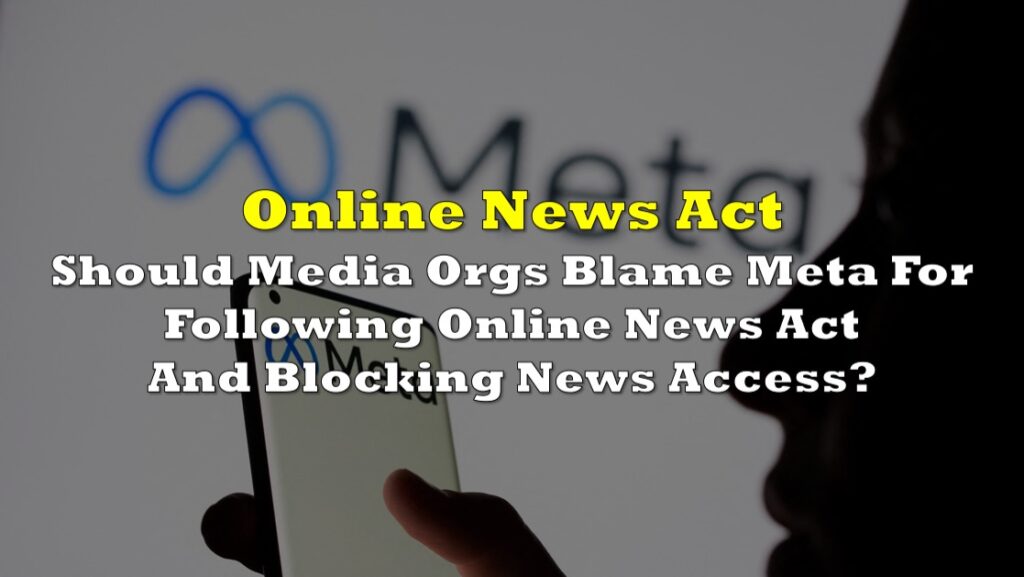In response to the recently passed Online News Act by the Canadian government, Meta Platforms (Nasdaq: META) announced its intention to block Canadians from sharing news on its platforms.
The law requires digital firms to pay domestic media organizations for the content they use. This move by Meta is consistent with its previous actions in Australia and its threat to block news in California if similar bills are passed.
“We have repeatedly shared that in order to comply with Bill C-18, passed today in Parliament, content from news outlets, including news publishers and broadcasters, will no longer be available to people accessing our platforms in Canada,” Meta said in a statement.
The Canadian legislation, modeled after a law passed in Australia in 2021, is part of the government’s broader efforts to regulate the digital sphere and curb the power of tech giants. It aims to address the revenue imbalance between Silicon Valley giants and media organizations, which have suffered significant financial losses due to the shift of advertising dollars to platforms like Facebook and Google.
Under the new law, tech companies will be obligated to negotiate compensation deals with news organizations for sharing or linking to their content. If negotiations fail, binding arbitration will determine appropriate compensation. The passage of this bill has been welcomed by News Media Canada, a lobbying group, which views it as a crucial step toward leveling the playing field and ensuring the sustainability of the Canadian news media ecosystem.
The Canadian Radio-television and Telecommunications Commission announced on Thursday night that the new law received Royal Assent, with the agency expected to soon share its plan for implementing the new Act.
Meta’s decision to block news content has drawn criticism, including accusations of “bullying tactics” by Prime Minister Trudeau.
“The fact that these internet giants would rather cut off Canadians’ access to local news than pay their fair share is a real problem,” Trudeau said earlier this month. “It’s not going to work.”
But industry experts believe it could set a precedent for similar legislation in larger markets worldwide. Jason Kint, CEO of Digital Content Next, anticipates that other countries such as Brazil, Britain, and the United States may follow Canada’s lead in implementing laws that hold tech giants accountable for paying for news content.
The search for Google News
Google, another major player in the digital sphere, has expressed concerns about the bill, suggesting it could lead to the removal of news links. The company argues that it already provides substantial value to publishers by driving traffic to their sites.
During a May testimony before a Canadian Senate committee, Richard Gingras, the vice president of Google’s news division, expressed his view that it would be a “reasonable” action for the company to prohibit news links in the event that the bill is enacted.
In a last-minute effort to prevent Google from blocking Canadians’ access to news search, Ottawa is engaged in eleventh-hour discussions with the company’s U.S.-based executives. The Prime Minister’s office intervened this week and initiated talks with Google regarding the proposed bill, which mandates that search engines and social media platforms like Facebook must establish payment agreements with news organizations for linking to or sharing their content.
Heritage Minister Pablo Rodriguez is currently engaging in video conference discussions with senior Google executives in the United States.
“The Minister is meeting with Google later today,” said spokeswoman Laura Scaffidi. “Following Royal Assent of Bill C-18, the Government will engage in a regulatory and implementation process. The tech giants do not have obligations under the Act immediately after Bill C-18 passes. As part of this process, all details will be made public before any tech giant is designated under the Act.”
While Google has not made a final decision on whether it will limit Canadians’ ability to search for news on its platform if the online news bill is passed as is, the company has already reached agreements with several Canadian news outlets, including the Globe and Mail. Google has expressed concerns over the bill’s lack of clarity regarding the inclusion of such agreements within the framework of Bill C-18.
Earlier this year, Google carried out tests that block access to news content for some Canadian users. The tests, which were temporary and affected less than 4% of Canadian users, limited the visibility of Canadian and international news to varying degrees, according to a Google spokesperson.
The bill has faced strong criticism from Google and Meta, as it places them under significant and potentially boundless liability for news links. As a strategy to avoid falling within the purview of the bill, both companies have expressed their intention to discontinue news-related activities.
However, Canadian officials maintain that the law is necessary to establish a fairer system, especially considering the alarming decline of media outlets in recent years.
Meta, currently facing challenges in the social media sector and undergoing significant restructuring, is striving to avoid a repeat of the Australian incident. The company has pledged to handle the Canadian situation more carefully and ensure that technical errors, which led to unintended consequences in Australia, are avoided.
With Meta’s decision to block news from its platforms, Canadians may experience restricted access to news content on Facebook and Instagram, raising concerns about the availability of diverse sources of information in the digital age.
Information for this briefing was found via The Globe And Mail, The Washington Post, and the sources mentioned. The author has no securities or affiliations related to the organizations discussed. Not a recommendation to buy or sell. Always do additional research and consult a professional before purchasing a security. The author holds no licenses.











